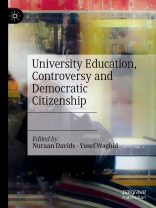This book explores the role of the university in upholding democratic values for societal change. The chapters advocate for the moral virtue of democratic patriotism: the editors and contributors argue that universities, as institutions of higher learning, can encourage the creation of critical and patriotic citizens. The book suggests that non-violence, tolerance, and peaceful co-existence ought to manifest through pedagogical university actions on the basis of educators’ desire to cultivate reflectiveness, criticality, and deliberative inquiry in and through their academic programmes. In a way, universities can respond more positively to the violence on our campuses and in society if public and controversial issues were to be addressed through an education for democratic citizenship and human rights.
Tabla de materias
Preface.- 1. Controversy and the Public Sphere: In Defence of Pluralist Deliberation; Yusef Waghid.- 2. Reconceiving a World around our Bodies: Universities, GBV and Social Justice; Nuraan Davids.- 3. Violent Pedagogy: Critical Pedagogical Self Reflection in the Midst of Engaging the Silencing Effects of Gender-Based Violence Within the Context of Higher Education; Charlene van de Walt & Judith Terblanche.- 4. Re-posturing the African University for Social Justice in Light of Increasing Violence; Chikumbutso Manthalu.- 5. Re-examining instances of cognitive damage in South African universities: Invoking democratic action through educational technology; Zayd Waghid & Faiq Waghid.- 6. Responding to the needs of the republic: Investigating the democratic/social role of the university in contemporary South Africa; Precious Simba.- 7. Identity (re)construction in Higher Education Spaces; Sinobia Kenny.- 8. Institutional culture and the lived experience of violence on university campuses in South Africa; Janine Carlse.- 9. ‘Burn to be heard’: The (in)-dispensability of ‘revolutionary’ violence in student protests and responsible citizenship in African public universities; Joseph Hungwe.- 10. On the Controversy of Democratic Citizenship and its Implications for University Education; Nuraan Davids and Yusef Waghid.
Sobre el autor
Nuraan Davids is Professor of Philosophy of Education in the Department of Education Policy Studies in the Faculty of Education at Stellenbosch University. Her research interests include democratic citizenship education; Islamic philosophy of education; and philosophy of higher education. Recent books include: The Thinking University Expanded: On Profanation, Play and Education (2020, with Y. Waghid); Democratic Education and Muslim Philosophy: Interfacing Muslim and communitarian thought (2020, with Y. Waghid); Universities, pedagogical encounters, openness, and free speech: Reconfiguring democratic education (2019, with Y. Waghid).Yusef Waghid is distinguished professor of philosophy of education at Stellenbosch University in South Africa. He is the co-author of the following books: Teaching, Friendship & Humanity (with Nuraan Davids, Springer, 2020); Teachers Matter: Educational Philosophy and Authentic Learning (with Nuraan Davids, Lexington Publishers, 2020); and Cosmopolitan Education and Inclusion: The Self and Others in Deliberation (New York: Palgrave-Mac Millan, 2020 with Chikumbutso Herbert Manthalu, Judith Terblanche, Faiq Waghid & Zayd Waghid).












